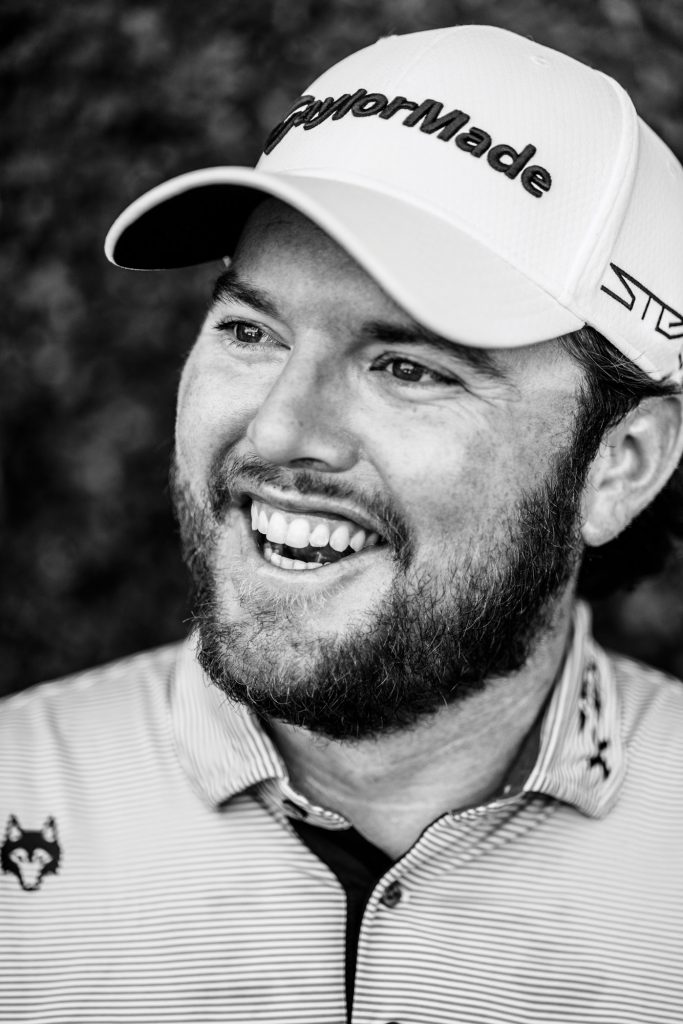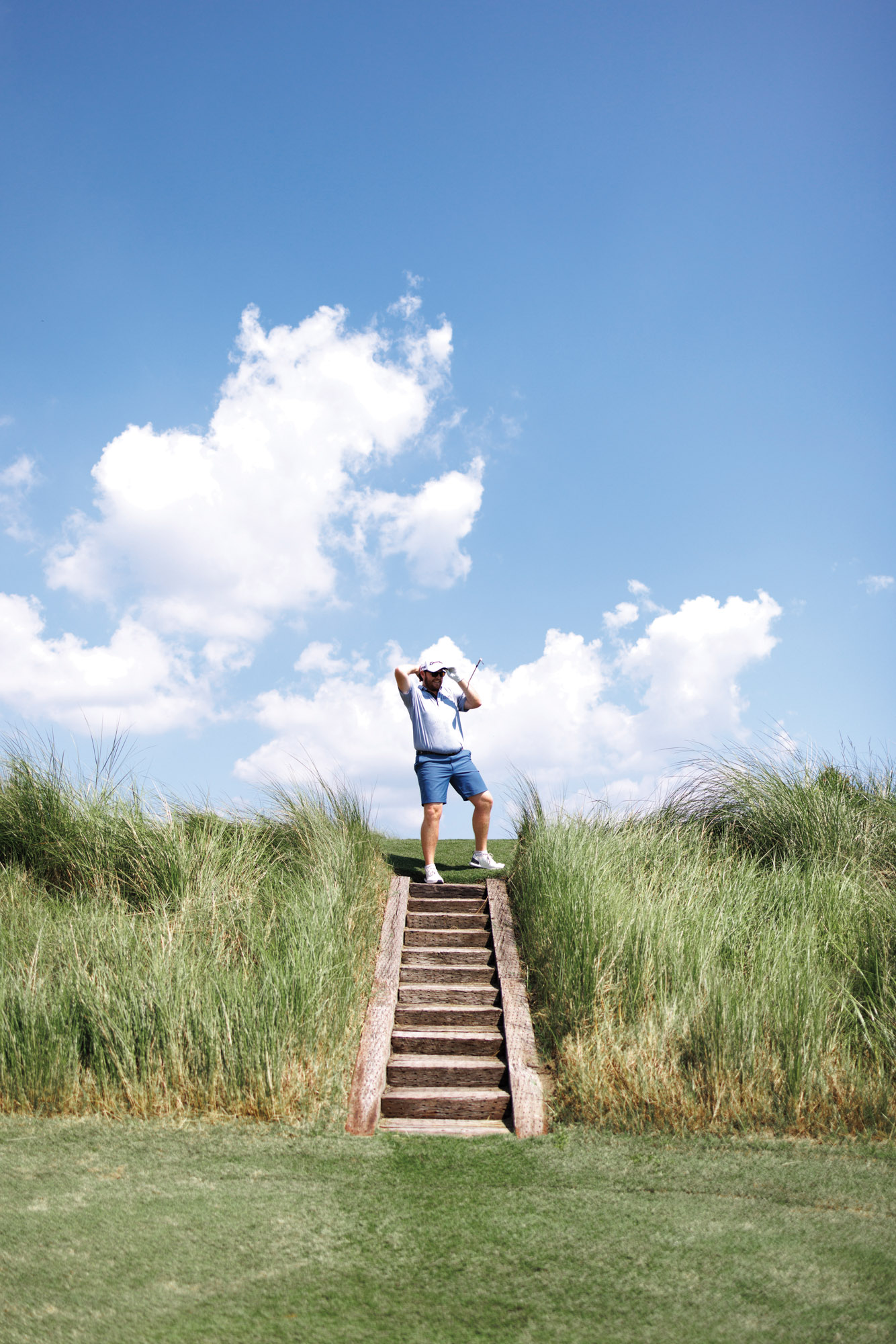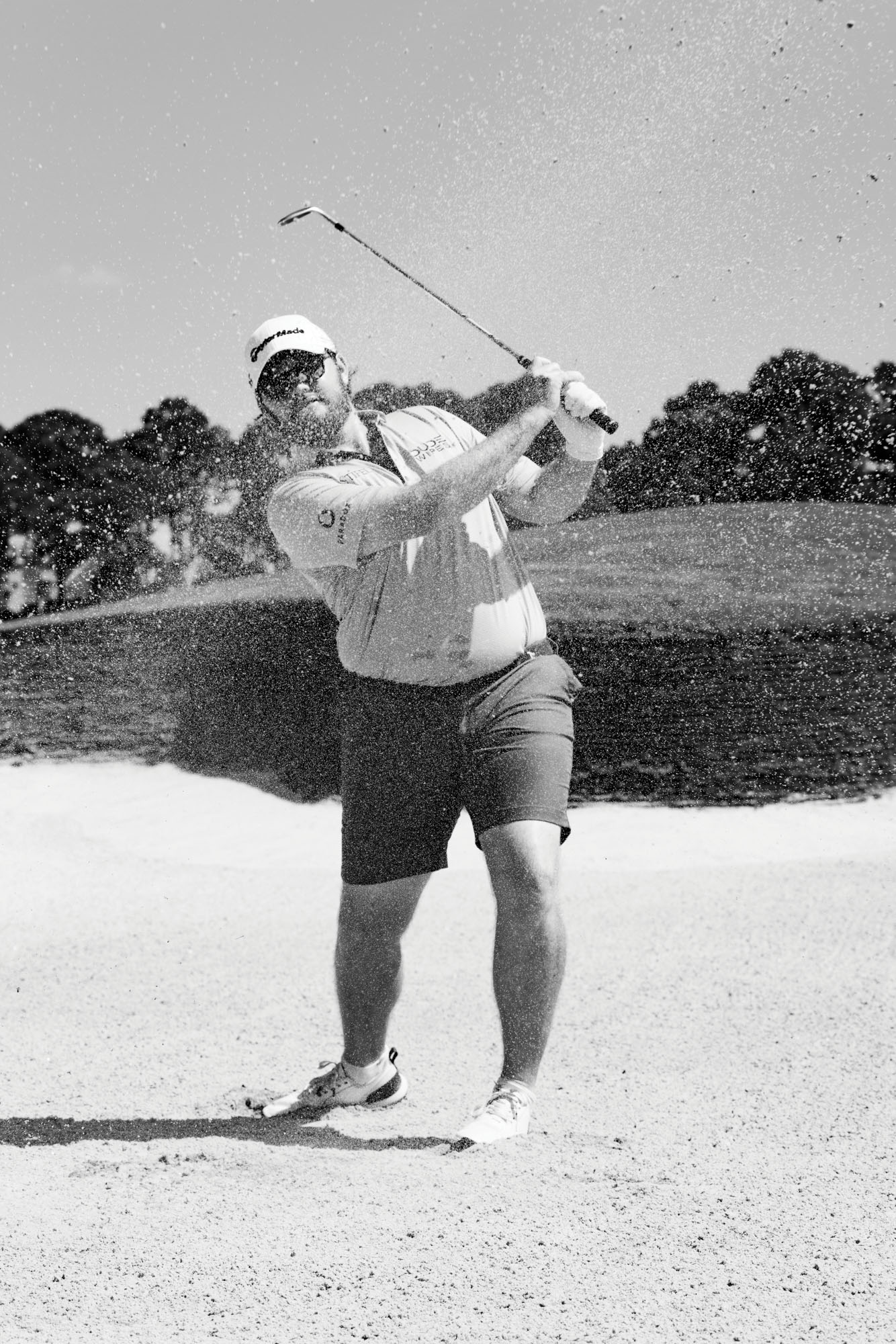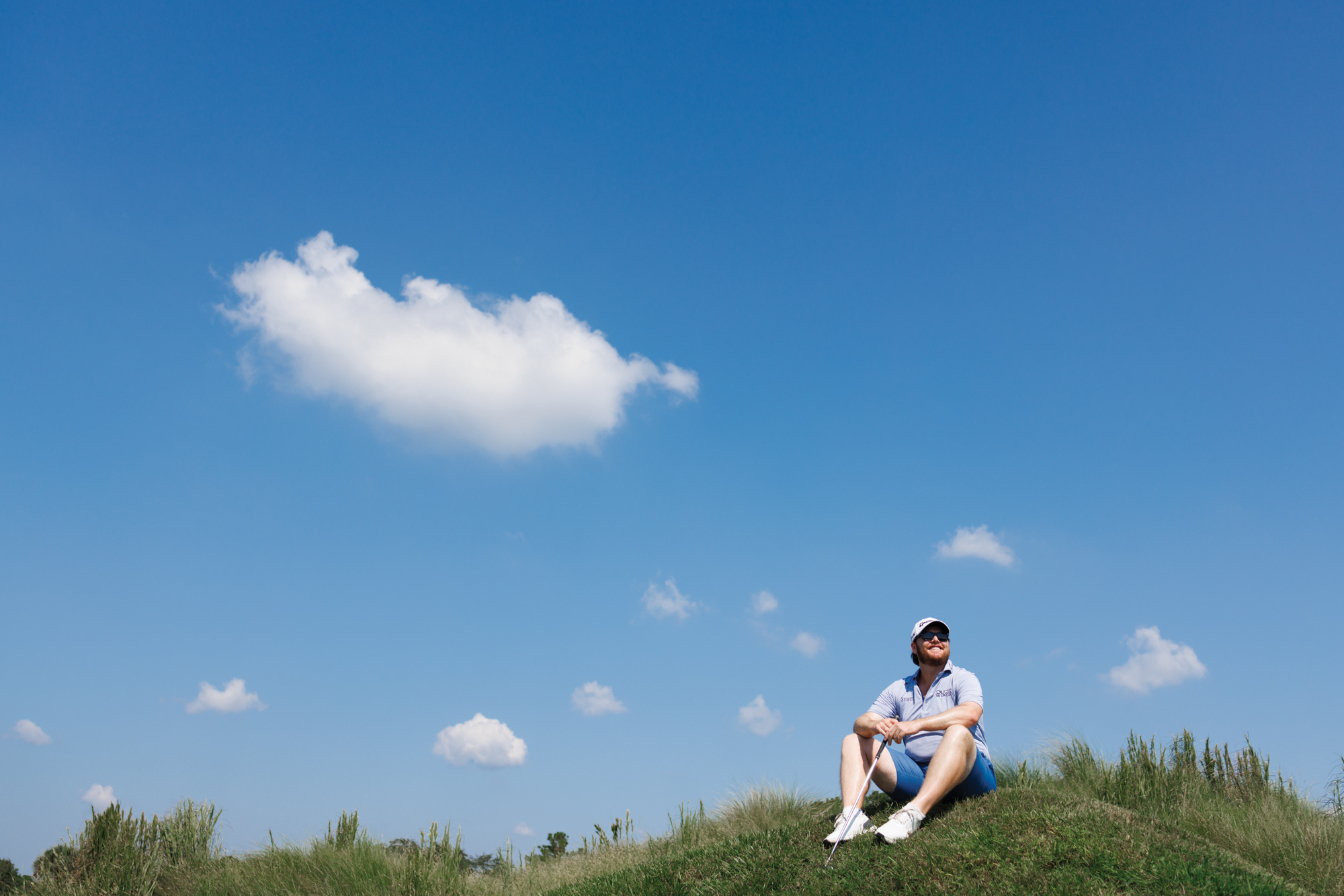Harry Higgs Plays Nice
Since climbing to fourth place at the 2021 PGA Championship at The Ocean Course, professional golfer Harry Higgs has had a wild couple years. Swinging back and forth between nice guy and fierce competitor, Harry Higgs plays with heart.
Story by Hailey Wist
Photography by Gately Williams

So where are you actually from? There’s a lot of conflicting information out there.
I was born in Camden, New Jersey, but we didn’t live there. We lived just outside Philadelphia, then Ohio briefly, and back to Philadelphia for a bit. I spent the majority of my young life in Overland Park, Kansas, just outside Kansas City. I went to school and currently live in Dallas. So it’s whichever you please.
Tell me about your first big break.
I was in my senior year of high school. The club that I grew up playing with was hosting the Korn Ferry Tour’s KC Golf Classic. This would never happen nowadays, but they had a junior qualifier for the event, and I wound up winning it. I showed up at school on a Monday, and I remember going to biology class. I stayed for five minutes and then got up and left and went to the golf course. I can’t remember if I was brazen enough to just leave. Maybe I said I wasn’t feeling well. I missed that entire week of school.
Let’s take you back to the beginning. How did you start golfing?
Dad started playing when we lived in Columbus, Ohio. He tells the story that he would set up Wiffle balls in the front yard, and my brother and I would practice swinging. When we moved back to the Philadelphia area, a golf buddy of my dad’s saw how obsessed we were and implored my dad, Your boys are drawing golf holes everywhere, and they’re air swinging. Just put golf clubs in their hands. So my dad bought a red set for me and a blue set for my little brother. And that was really that.
We moved to Kansas City four years later and lived on a golf course. I was in fourth grade. I would finish school, get on my bike with my clubs on my back, and ride down to the club. There was a group of kids that would meet there. They’re still great friends of mine to this day.
You’re reminding me of the scenes in Caddy Shack where a bunch of kids hang around the golf course, and they’re all dating each other. It sounds so fun.
My girlfriend now was actually part of that group. Her brother and I became good friends, and then she started playing. So we met there.
How do you think that experience shaped your career?
I was super lucky that I had peers who were golfing. But also twelve-year-old Harry would play with anybody. A lot of people say I can sit in a room and converse with anybody, that I can get along with people from all walks of life. You could trace that back to golfing with doctors and lawyers and men with kids my age when I was twelve. I joke now that if I play with somebody that doesn’t like to talk, I’m gonna get it out of him. We’re gonna talk all day. Or at least I’m going to. (laughs)
 When did you realize that you had potential for a golf career?
When did you realize that you had potential for a golf career?
I was a lot bigger than kids my age. I don’t know where the skills came from, but I had a lot of skill. And when I got into competitive golf, I had immediate success. Partly because at that young age, you play shorter golf courses. I was probably three inches taller than all the other players and could hit the ball a long way. At first I was winning everything I played in. So I think it was straight-up delusional confidence, and I held onto that throughout my entire golf career. I continued to have success in high school. And then I got to college, and those guys were really good. But for me, it wasn’t a bad thing that I wasn’t as good as them. It was like, Okay, well I just need to get better.
Tell me about college.
I went to Southern Methodist University. When I showed up freshman year, I thought I was hot shit. There were ten rounds in two weeks to qualify for the first tournament. Going into the last round, I was seven or eight shots ahead of everybody, and I was such a pain in the ass about how good I thought I was. Kelly Kraft, who’s now a great friend of mine, was a senior at the time, and he shot eight or nine under and beat me. That was one of the first times I thought, Okay, maybe he has an ability that I don’t yet have. Honestly, after that I struggled my entire freshman year. Which Harry do I want to be? Do I want to be the Harry who is friendly with his teammates? Or do I want to be a [competitive] jerk who thinks he can beat everyone. I wound up being fun, sweet Harry a lot more. I just wanted to be friends with everybody.
Does that negatively impact your game?
Yeah. Now I try to have a little bit of both. I want to be very good at what I do, but also I want to be liked. There’s a constant balance. But it goes back to that freshman year. I remember making a decision that I’d rather just have fun with my teammates. My golf game struggled because I didn’t want to get into those guys’ faces.
Being fun, sweet Harry takes away some of the focus and intensity?
I’ve had plenty of moments in my professional career when I struggled because I felt small, like I was just happy to be there and share the stage with everybody. But on the flip side, I’ve had success in big events when I didn’t care about any of that, when I concentrated on beating everyone. You need confidence in this game. Delusional confidence. My senior year, I was the only senior on the team. There wasn’t even a junior. So you can imagine, it was easier for me to be the ass, and I started playing some really good golf.
Where did you go after college?
I started the PGA Tour Latinoamérica as soon as I left college. I traveled to Mexico and Central and South America with a bunch of guys. Everyone was fresh out of college. You can imagine—it was a free for all—a giant fraternity. I just wanted to be liked by those guys; I just wanted to have fun. And so I struggled for two, almost three years.
But when I returned to the tour in 2018, I felt like, Okay, I’ve done this. I don’t want to do it again. I got serious and competitive. I felt like I could beat anyone. I finished third in the second event and second in the fourth event. I kept having good weeks, and then I wound up winning the entire money list in the fall. I was able to roll that into my Korn Ferry tour year.
You were on a roll.
Yeah, a major roll. That carried into the PGA. After Korn Ferry I had about a week off, and then I started playing PGA Tour events. If I had started on the PGA Tour at twenty-three years old, it would have been different. I don’t think I would’ve started like I did. But I got there at twenty-seven and felt like, I don’t care who any of you people are. I’m just gonna beat you guys.
How do you deal with nerves?
I don’t mind them. I’ve done this for a long time now, and I know what’s coming. You train your entire life to be in a position to win a golf tournament. And when you have these [winning] moments, you feel great, right? You get to celebrate, you make money. But if you hit a poor shot, you’re going to be miserable. You’re going to think about it for the rest of your life. It’s a razor’s edge. I think we’re all just crazy enough to want to be in those positions.
Talk about the PGA Championship at Kiawah.
It was my first major. I had no idea what it was going to be like. I remember teeing off on ten Thursday morning and feeling super nervous. I hit a poor tee shot and then got a good break for a shot towards the green. I hit it on the green. Then an easy two putt for par, and I took a deep breath. Then I hit another poor drive on eleven, which was my second hole of the day. I made the dumbest decision to try to lay it up more aggressively rather than leave it short where it would have been a very easy up and down for birdie. Then I hit it way left into the dunes. I wound up finding my ball and made an unbelievable par from there. But I turned to my brother and said, We are not doing that shit again. Let’s clean it up.
 What did you do?
What did you do?
Basically, I decided to hit the most boring basic golf shot on every hole from there on out. For the next four days, we just did that. And it just kept adding up and adding up. I played it nice and tight and by the book. The Ocean Course is insanely difficult. It’s windy and hard to get the ball onto the fairway, and it’s hard to get the ball on the greens. So I decided to do the boring things and do them really well. If you do that for four days and then sprinkle in a few birdies, that’ll do it. Because no one was going to win that golf tournament at fifteen under because the course was so hard. I finished fourth.
Tell me about your relationship with your brother and how he became your caddy. You guys are obviously close.
Too close. (laughs) He’s three years younger than I am. He went to SMU and played golf as well. So when I was a senior, he was a freshman. He played professionally for two and a half years. I thought it would be good to make a caddy change and felt like it would be best if I had my brother with me. We’ve obviously played a ton of golf together, and he’s a world-class caddy. You’d be astounded by the stuff he knows. We do get caught up in the older brother-younger brother dynamic. It’s very easy for me to complain about something that he’s done when he probably didn’t do anything wrong. I want his input, but I’m not always cool with it.
How did this partnership with Kiawah come about?
It was very organic. My manager told me that the South Street guys wanted to meet me the Wednesday of the Championship. And obviously, Kiawah will always hold a very special place in my heart. That was a lovely week for me and my family. My parents, my brother, and my girlfriend were here. We rented a house six minutes from the clubhouse. It was a great week amplified by good play. I don’t think I’ll ever forget it.





